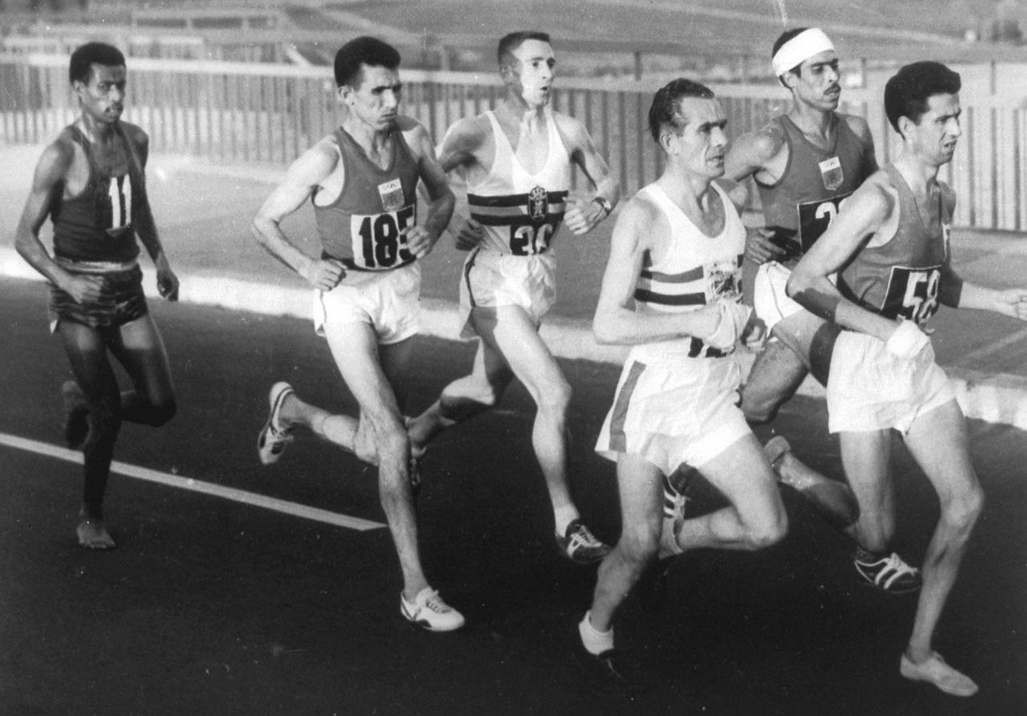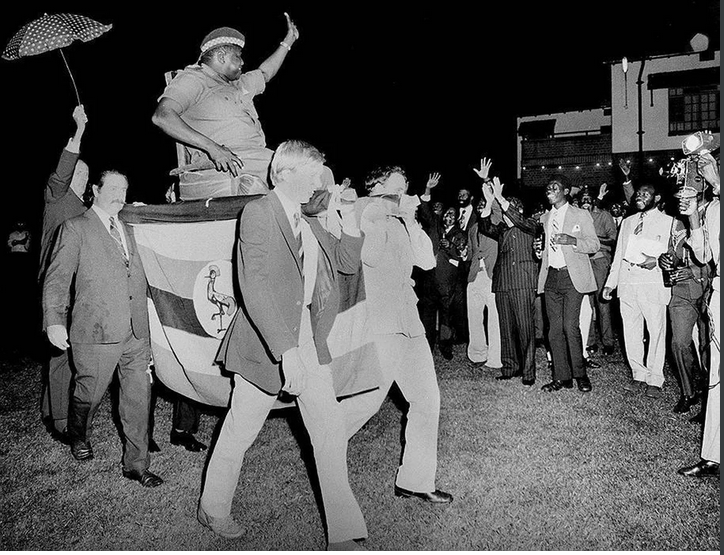The Running Pioneers and the Imposters
By Dr. Barefoot Sidy Diallo
The Running Pioneers
The running pioneers are those early humans who developed the abilities for long-distance running 3 million years ago—not the white males who pretended to reinvent the wheel in 1896.
A self-proclaimed “running pioneer” claimed that he was “running marathons in countries before I was born,” i.e. before he turned 11, a dubious “achievement” for such a young boy in the pre-aviation era and when only few countries—namely Japan, South Korea, Slovakia, South Africa, the UK and the US—were organizing marathons. The running pioneers are those humble individuals of early human species that around three million years ago went from zero to developing the abilities for long-distance running, i.e. persistence hunting, which is the most extraordinary human achievement and the mother of all human achievements.
They not only developed the abilities and the best technique for fair hunting—no cheating with weapons—but also regularly chased the animals for food to ensure the survival of human species. We should therefore be grateful to them for their achievements and for leaving us an inhabitable planet and exceptional abilities to run “marathons.”
These inherited exceptional abilities mean that running a marathon should never be about bragging rights or social recognition, but humbly about enjoying our hunter-gatherer moment while building fitness and happiness, and preventing obesity, type 2 diabetes, dementia, depression, stress and other chronic diseases, instead of seeking delight or the meaning of life in addictions to food, legal or illegal psychotropic drugs, wealth, cruelty, political power, etc.
The Arrogant Imposters
When I left a marathon club because of their incoherent definition of countries, the grumpy president of the club misguidedly felt entitled to lecture me about running pioneers and even French geography in two emails: “You should always check the facts. The pioneers of the club were much wiser and running marathons in countries before you were born. I have a problem understanding your ignorance of this fact: Paris and Marseille are regions...”
Well, regarding his “problem understanding my ignorance,” I’d expect him to know at least what Paris is: Any French high school student can tell him that Paris and Marseille are cities—not regions. Paris is one of the cities of the region Île-de-France, and Marseille is in the region Provence-Alpes-Côte d’Azur.
The Running Pioneers
The running pioneers are those early humans who developed the abilities for long-distance running 3 million years ago—not the white males who pretended to reinvent the wheel in 1896.
A self-proclaimed “running pioneer” claimed that he was “running marathons in countries before I was born,” i.e. before he turned 11, a dubious “achievement” for such a young boy in the pre-aviation era and when only few countries—namely Japan, South Korea, Slovakia, South Africa, the UK and the US—were organizing marathons. The running pioneers are those humble individuals of early human species that around three million years ago went from zero to developing the abilities for long-distance running, i.e. persistence hunting, which is the most extraordinary human achievement and the mother of all human achievements.
They not only developed the abilities and the best technique for fair hunting—no cheating with weapons—but also regularly chased the animals for food to ensure the survival of human species. We should therefore be grateful to them for their achievements and for leaving us an inhabitable planet and exceptional abilities to run “marathons.”
These inherited exceptional abilities mean that running a marathon should never be about bragging rights or social recognition, but humbly about enjoying our hunter-gatherer moment while building fitness and happiness, and preventing obesity, type 2 diabetes, dementia, depression, stress and other chronic diseases, instead of seeking delight or the meaning of life in addictions to food, legal or illegal psychotropic drugs, wealth, cruelty, political power, etc.
The Arrogant Imposters
When I left a marathon club because of their incoherent definition of countries, the grumpy president of the club misguidedly felt entitled to lecture me about running pioneers and even French geography in two emails: “You should always check the facts. The pioneers of the club were much wiser and running marathons in countries before you were born. I have a problem understanding your ignorance of this fact: Paris and Marseille are regions...”
Well, regarding his “problem understanding my ignorance,” I’d expect him to know at least what Paris is: Any French high school student can tell him that Paris and Marseille are cities—not regions. Paris is one of the cities of the region Île-de-France, and Marseille is in the region Provence-Alpes-Côte d’Azur.
The marathon is an instinctive repackaging of persistence hunting by dominant white males who in 1896 deceptively or ignorantly pretended to reinvent the wheel, and banned even their mothers, sisters and daughters from participating in a marathon for over 70 years. They fallaciously portrayed themselves as the few exceptional humans who can run 42.2 km (26.2 miles), and stupidly ruled that “women were not physically capable of running a marathon.”
The role of their sisters at Wellesley College was to cheer on them halfway of the Boston Marathon, a tradition that’s still going on, although the women conquered their right to run marathon over 40 years ago.
The dominant white males first panicked at the 1960 Olympic Marathon in Rome when they realized that a black barefoot runner--Abebe Bikila from Ethiopia—was about to beat and humiliate them, which he did. Look in the following photo at the contrast between their desperate faces and the cool Abebe Bikila “stalking” them in the streets of the Italian capital.
The role of their sisters at Wellesley College was to cheer on them halfway of the Boston Marathon, a tradition that’s still going on, although the women conquered their right to run marathon over 40 years ago.
The dominant white males first panicked at the 1960 Olympic Marathon in Rome when they realized that a black barefoot runner--Abebe Bikila from Ethiopia—was about to beat and humiliate them, which he did. Look in the following photo at the contrast between their desperate faces and the cool Abebe Bikila “stalking” them in the streets of the Italian capital.
The coup de grace came a century after the first marathon when young runners from East Africa became the elites, prompting the losers to invent “speed genes” to justify their humiliation, and desperately create exclusive running clubs for the rich: seven continents clubs, 100 marathons clubs, etc. Some indulge in cheating to inflate their “performance,” beat a time limit, increase the number of their marathons or countries, etc.
Humans are a hunter-gatherer species, which means the “modern” marathoner is simply a hunter-gatherer individual knowingly or instinctively practicing persistence hunting. Sadly, current humans are so brainwashed that many still think that only exceptional humans can run a marathon, even for instance when over 52,000 runners—including a 93-year-old man and an 83-year-old woman completed the 2023 Paris Marathon. Homo sapiens has evolved into Homo stultus.
The Rational Indicators of Runners’ Performance
Persistence hunting was a collective and non-competitive human activity for survival. Catching the animal was their motivation. There was no reason and no room for cheating.
Since nowadays marathoners enjoy easy access to food with the risk of developing obesity, dementia and other diseases, the rational indicators of running performance are their physical and mental health and their fitness relative their age—not deserved or cheated records, certificates or rankings.
In a parody of British and French colonial manners in Africa, British businessmen carried in a sedan chair—with another white man holding a sunshade—Ugandan president Idi Amin in 1975 from his residence to a meeting of the Organization of African Unity in Kampala.
“I think you have heard I was being carried at 258 pounds (117 kg) by 19 people who managed to carry me 11.5 miles, and they were very tired,” Amin later quipped.
Cars, trains, buses, electric scooters, electric bikes, etc., have replaced the colonial sedan chairs, but contrary to widespread belief, our hunter-gatherer body is designed for long-distance running and walking—not for physical inactivity and motorized locomotion, nor for the consumption of psychotropic drugs (tobacco, alcohol or other drugs), hence the increasing prevalence of chronic diseases, including obesity, high blood pressure, heart diseases, type 2 diabetes, dementia, fatigue, insomnia, stress, depression and vulnerability to pandemics.
In short, doing many marathons and staying away from psychotropic drugs are the key to preventing these chronic diseases and the loss of physical and mental abilities: the popular post-race beer or wine is not good for the brain cells nor for heart cells or other cells.
Humans are a hunter-gatherer species, which means the “modern” marathoner is simply a hunter-gatherer individual knowingly or instinctively practicing persistence hunting. Sadly, current humans are so brainwashed that many still think that only exceptional humans can run a marathon, even for instance when over 52,000 runners—including a 93-year-old man and an 83-year-old woman completed the 2023 Paris Marathon. Homo sapiens has evolved into Homo stultus.
The Rational Indicators of Runners’ Performance
Persistence hunting was a collective and non-competitive human activity for survival. Catching the animal was their motivation. There was no reason and no room for cheating.
Since nowadays marathoners enjoy easy access to food with the risk of developing obesity, dementia and other diseases, the rational indicators of running performance are their physical and mental health and their fitness relative their age—not deserved or cheated records, certificates or rankings.
In a parody of British and French colonial manners in Africa, British businessmen carried in a sedan chair—with another white man holding a sunshade—Ugandan president Idi Amin in 1975 from his residence to a meeting of the Organization of African Unity in Kampala.
“I think you have heard I was being carried at 258 pounds (117 kg) by 19 people who managed to carry me 11.5 miles, and they were very tired,” Amin later quipped.
Cars, trains, buses, electric scooters, electric bikes, etc., have replaced the colonial sedan chairs, but contrary to widespread belief, our hunter-gatherer body is designed for long-distance running and walking—not for physical inactivity and motorized locomotion, nor for the consumption of psychotropic drugs (tobacco, alcohol or other drugs), hence the increasing prevalence of chronic diseases, including obesity, high blood pressure, heart diseases, type 2 diabetes, dementia, fatigue, insomnia, stress, depression and vulnerability to pandemics.
In short, doing many marathons and staying away from psychotropic drugs are the key to preventing these chronic diseases and the loss of physical and mental abilities: the popular post-race beer or wine is not good for the brain cells nor for heart cells or other cells.
My book Running Barefoot for Human Survival is available on Amazon in paperback and e-book format (French edition: Courir pieds nus pour sauver les humains).

